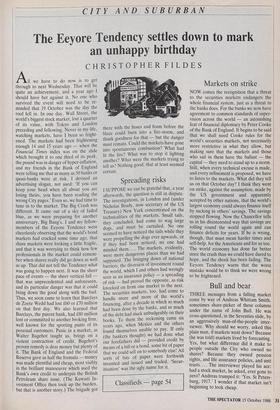Markets on strike
NOW comes the recognition that a threat to the securities markets endangers the whole financial system, just as a threat to the banks does. For the banks we now have agreement to common standards of super- vision across the world — an astonishing feat of financial diplomacy by Peter Cooke of the Bank of England. It begins to be said that we shall need Cooke rules for the world's securities markets, not necessarily more restrictive in what they allow, but making sure that the markets and those who sail in them have the ballast — the capital — they need to stand up to a storm. Still, when every technical excuse is made, and every refinement is proposed, we have to listen to the markets. What did they tell us on that October day? I think they went on strike, against the assumption, made by the US government and apparently accepted by other nations, that the world's largest economy could always finance itself by sucking in others' savings. The savings stopped flowing. Now the Chancellor tells us in his disinterested way that savings are rolling round the world again and can finance deficits for years. If he is wrong, though, that must mean harder times and self-help, for the Americans and for us too. The world economy has done far better since the crash than we could have dared to hope, and the shock has been fading. The Eeyore Tendency warns that the worst mistake would be to think we were wrong to be frightened.


























































 Previous page
Previous page